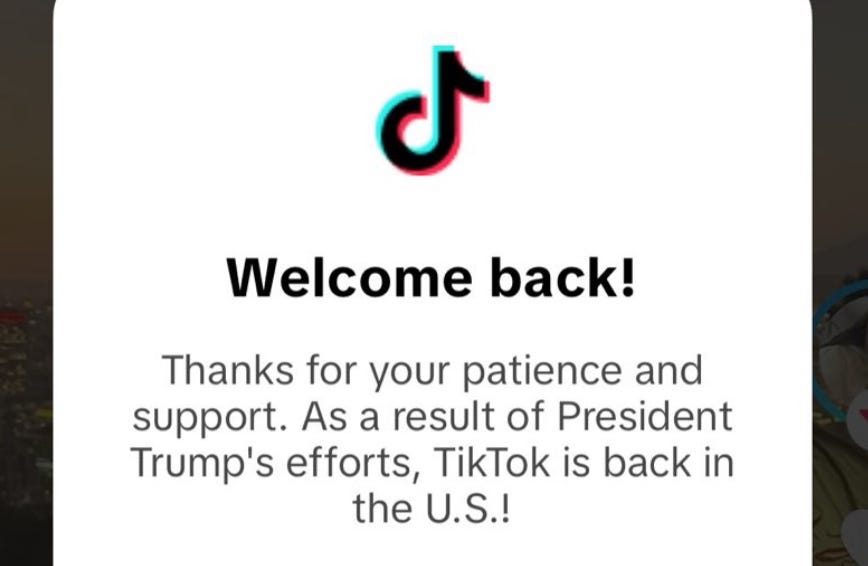TikTok came back. Then I deleted the app.
Looking for something to root for in the fight for TikTok.
One of our great writers, Paul Ford, put it like this a couple hours ago: “as the rollercoaster crests the top of the initial incline, the ratcheting noise slows and stops, and you can, right before the plunge, observe the entire amusement park.”
The Trump II Administration has arrived a day early. TikTok, after shutting down in the U.S. last night to avoid mandated divestment from Chinese-affiliated ownership, is back online. Maybe illegally? Congress had passed a bipartisan law, signed by President Biden, approved 9-0 by the Supreme Court, that is still on the nation’s books. But then Trump posted something promising to issue an executive order saying TikTok can return while everybody works out a nationalization plan, and weird stuff started happening.
"Welcome back!” a TikTok notice chirped at American users. “Thanks for your patience and support. As a result of President Trump's efforts, TikTok is back in the U.S.!"
That’s when, on a sudden and decisive impulse, I deleted TikTok from my phone, ending a four-year, one-sided relationship with one of America’s most wonderful and frustrating derangement machines.
There is a single iron law of using the internet in 2025: You have to get more out of a platform than the platform gets out of you. What’s human has to win, and everything else is downstream. The tragedy of poor John Henry is only hardwired into our folklore because John also beat the engine.
Like many sudden breakups, my divorce from TikTok wasn’t the fault of one thing but many, working in invidious tandem.
I picked up my TikTok habit back in the COVID-19 isolation days when we were all cooped up, alone, bored. (There were those sea shanties.) The app gradually became the thing that filled the silences when it got dark outside. Mainly, I mined TikTok for jokes and animal videos and tried to avoid thinking too hard about how the miraculous, chaotic scroll resembled a slot machine. After a while, I noticed I had stopped watching television, and it took me a while to connect this with the collapse of Hollywood around me in Los Angeles. Some weariness had eaten away at the edges of my attention span.
The reason I had become a late adopter of TikTok, and the reason I never posted videos myself, was because I had never been able to dislodge the personal discomfort I’d gotten from the early-years reports of special moderation of topics sensitive to China, like the Tiananmen Square massacre. How much meddling was there, really? TikTok’s algorithm is so all-intrusive as a curator, and has just enough human manipulation, that you’d never know what you didn’t know.
Eventually, I just gave up thinking about that so much. TikTok was fine, basically, and like many things in life, you can get away with a lot when you’re competent at what you do. I got complacent about seeing creators use words like “unalived” instead of “killed” or “murdered” to avoid potential censorship whenever talking about something that matters. Over time, what came to feel so oppressive wasn’t Chinese influence but the same algorithmic paternalism and absentee landlordism currently knitting itself across almost every surface of our internet.
Like a lot of federal digital policy, the TikTok divestment law was certainly annoying for its incoherence. (If mining my personal data is a national security threat, the CIA should rendition Mark Zuckerberg to Guantanamo Bay.) But I found myself struggling to find something to root for — including the First Amendment arguments about the importance of limiting government regulation of the handful of gigantic platforms that shape, oversee, and exploit the private conduct of hundreds of millions of people, including me.
There’s an unhappy class dimension to First Amendment law that, as a journalist, I think about all the time: The Supreme Court’s 9-0 ruling against ByteDance, which brushed aside its First Amendment concerns, started by dispatching the other TikTok user appellants as irrelevant. Any reporter who’s gotten in a fight with a publisher could probably tell you that one was coming: Your right to speak through a medium is more directly connected to your ownership of that medium than to the First Amendment. When it comes to speech, most of us are mere tenants.
Nonetheless, CEO Shou Zi Chew’s job is to save TikTok from intrusive regulation, and I commend him for playing the game so effectively, if shamelessly. But if any groveling is being posted on my behalf, let me spare you the effort. I find it too strange to watch the leadership class of a country realign so tightly with Donald Trump’s reality-distortion field. The people involved are starting to resemble the “sir!” stories Trump loves telling. There’s a new political algorithm in the United States of America, and the country’s power users have already started figuring out what gets engagement.



This is the way. Why stay when you have just been manipulated by the app in the most egregious possible manner?
I also had a visceral reaction to that return message and immediately deleted both my account and the app. 175 million Americans just got told that Donald Trump was saving their brain rot app (forgetting of course that he STARTED the ban).